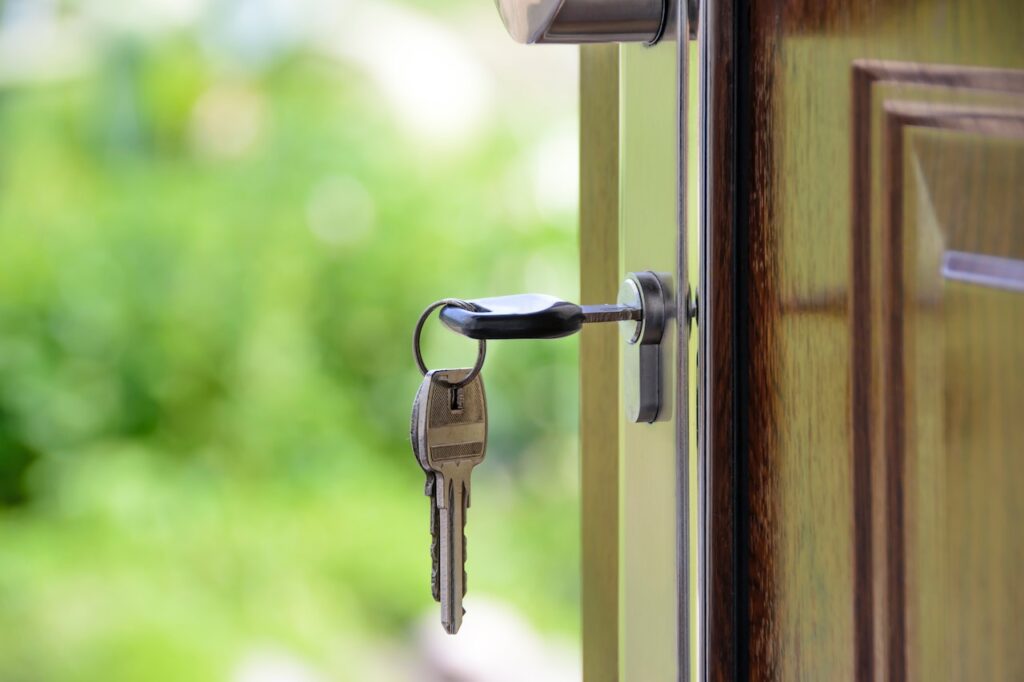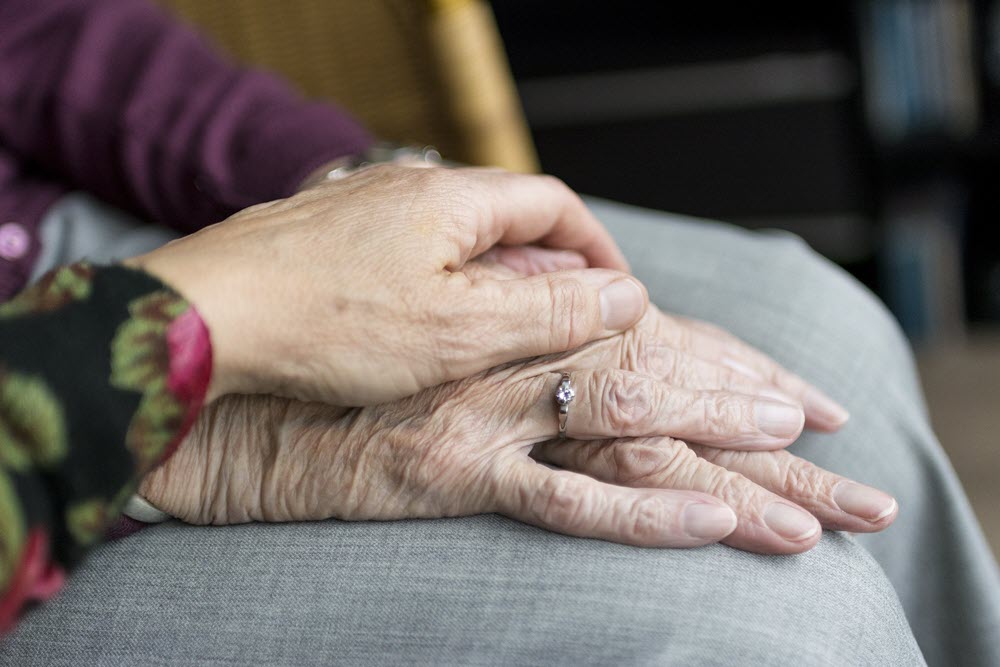
Wandering is a serious issue for patients with dementia and can easily put them in danger – particularly if they wander away from the home. After all, the senior may not be able to keep themselves safe or find their way back again.
There are other issues too, like when they get up in the night and risk falling down the stairs. Some seniors even end up starting the oven in the kitchen or doing something else dangerous.
Locking them inside may seem like the easiest solution, but is it illegal to lock a person with dementia in the house? What about locking them in their room?
To be clear, we’re specifically talking about making it so the senior can’t get out – perhaps because of how far their dementia has progressed or because the door requires a key to unlock. So, you’re intentionally trapping them inside the house or even inside their room – to keep them safe.
Listen To This Post Here:
Why Might You Lock a Dementia Patient Inside?
For some, the idea of locking anyone inside might sound horrible.
Yet, countless dementia caregivers have considered this or done it at least once. This is particularly true in the later stages of dementia, where the patient is struggling with their environment. Here, confusion can lead to wandering, falls, and even severe accidents.
Keeping an eye on someone 24/7 simply isn’t possible. You have your own needs too, including the need to sleep. Plus, dementia care is exhausting. It often means you’re on edge constantly, which isn’t sustainable.
With that in mind, locking the dementia patient in the house while you run to the store or locking their room overnight isn’t that unreasonable, right? Much of the time, the senior mightn’t even know that they can’t get out.
So, Is It Illegal?
Most reports empathically say – yes. You can’t legally lock someone up, even if it’s just for a few hours, just overnight, and even if only you’re doing so to keep them safe.
A few sources say it may be legal to lock them in only if you are truly doing so to protect them and it is the least restrictive option. However, may is the operative word here. The law often isn’t this nuanced.
It’s much more likely that locking is incredibly illegal, even if you can’t think of a safe alternative.
Why is Locking Them Up So Problematic?
There are plenty of arguments for why you might lock a dementia patient in the house. After all, it’s hard to keep someone safe when they’re not fully aware of the environment around them.
There are also plenty of times when the person mightn’t even be aware that the door is locked.
So, if locking the door occasionally keeps the senior safe and often doesn’t have a negative impact, why is there so much concern?
It’s a Violation of their Rights
First, keeping anyone against their will is a violation of their basic human rights.
There are obvious exceptions to that principle, including memory care facilities and prison, but those are carefully managed and subject to a huge set of rules.
If you’re doing so at home, locking someone in clearly violates their rights.
The fact that the senior doesn’t understand what’s happening doesn’t make the practice any better.
It Can Be Awful
Dementia itself can be rough and terrifying. As the disease progresses, seniors don’t just struggle with memory, but also with their sense of who they are, where they are, and what’s happening.
Imagine being stuck in a room or house that feels completely unfamiliar, that’s confusing and overwhelming – then finding that the doors are locked.
The situation could be incredibly distressing for seniors, even more so if you’re in a different room or asleep.
There Could Be an Emergency
What if something happens? Like if the front door is locked and there’s a fire? Or, your family member needs to get out of their room and can’t?
An emergency like this might seem unlikely, but emergencies happen more often than you might expect and can have devastating effects.
Things Typically Get Worse
There’s also the slippery slope argument.
You might start by locking the front door when you need to run a quick errand or want to make sure your loved one doesn’t wander at night. But, it’s easy to lock the door a little more often or a little longer at a time.
This is particularly true if you’re fatigued or overwhelmed.
At what point does locking them in stop being the safest solution? When is it the one you choose because it is the least draining? And when does it simply become a go-to?
The distinction between these areas is incredibly hard to spot when you’re in the middle of caregiving.
Besides, can you imagine the issue getting better? Dementia is a progressive condition. Any challenges you’re facing in caring for your family member now will only get worse as the disease runs its course.
The Repercussions Can Be Severe
Even if you’re focused on protecting your loved one and only lock them in when you can see no other solution – the approach can easily get you accused of elder abuse.
This could be enough to see the senior taken out of your care. You might even have charges filed against you.
Remember that senior abuse is taken seriously and if adult protective services (APS) is called in, they’re the ones assessing whether the situation constitutes abuse. Why put yourself in that situation?
What If They Consent?
This discussion has assumed that the patient’s dementia has progressed enough that they’re not fully aware of their environment and are sometimes unsafe wandering on their own.
In this situation, it doesn’t really matter if they agree to being locked in or not – as they’re not aware enough for that consent to mean anything.
If the senior is competent enough to make the decision and does consent to being locked in, then this might be legal (might is the operative word here). However, doing so still isn’t wise, especially as the senior’s dementia progresses.
Is It Really The Best Solution?

Locking a senior in a room or a house isn’t ideal, but it may still seem like the best option.
For example, if the senior has a room on the second floor and sometimes wanders at night, there’s a huge risk of injury. You could try a door alarm or a pressure sensitive floor mat, but there’s no guarantee that you’d get there in time.
Plus, such approaches can easily lead to disturbed sleep, which is impractical in the long-term (you need to get your sleep if you’re going to be an effective caregiver).
In that situation, locking the senior in might seem like your only option – but it’s not.
What Can You Do Instead?
Focus on Person-Centered Dementia Care
It’s easy to default to a symptom-focused form of dementia care, which often includes trying to minimize problematic behaviors.
While this might seem like the most logical approach, it often doesn’t work as well as you might imagine. After all, the person with dementia isn’t intentionally being difficult. They’re having a difficult time of it all too.
Person-centered dementia care involves a greater focus on where the individual is at and what they need. This includes taking their interests and preferences into account (as much as possible). You may also develop activities to do with them and find ways to keep them involved in daily life, even in just little ways.
Such approaches help to reduce anxiety in the person with dementia, which can lead to fewer problematic behaviors, including wandering.
If you don’t know where to begin, look at the book What I Wish People Knew About Dementia. This was written by Wendy Mitchell and describes her experiences living with dementia, with some insights from other people with the condition.
This book is helpful because it shows what the condition can look like from the inside, including some of the cognitive changes that can lead to ‘problematic behaviors’.
Much of the book focuses on memories and her own experiences, rather than specific techniques that you can adopt. Even so, the information she offers could make a huge difference as you work to support a loved one.
Resolve Issues as they Arise
You may also simply need to deal with issues that come up.
For example, leaving the house unlocked may mean that the senior does wander. But, products like a GPS tracker or a Wandering Response Service can help to make sure the senior is found quickly and is returned home.
Step Back from Caregiving
If things feel dire and it seems like locking the senior in is the only approach that will work – it might be time to make a big change.
In particular, the issue is a huge indication that the senior needs more care than you can provide. They may need 24/7 supervision, which isn’t possible for one person.
This isn’t a sign of failure at all.
Many families go through something similar. It’s incredibly difficult to care for a dementia patient at home, especially as the disease progresses into its final stages.
Paid help may make the difference, particularly if you can get someone to stay overnight. But, even then, it might get to the point where you can’t safely care for your loved one at home.
Take the idea of locking your loved one in as a sign that you need to do some serious reflection on what’s best for you and the person you’re supporting.
How Do Care Homes Do It?
The idea of locking dementia patients inside raises an interesting question – what about memory care facilities?
After all, these do sometimes hold dementia patients against their will. This may involve locking them in the facility itself or even in their room.
The difference is that there are many legal processes, plus checks and balances to make sure that the senior is really being protected.
You may want the best for your loved one and be trying to protect them, but that doesn’t make doing so okay.
Final Thoughts
There are no two ways about it – locking a dementia patient in the house is a bad idea.
But, you’re not a bad person for considering the approach. Many caregivers have thought of something similar in the past. Some have even acted on the idea.
Caregiving has that effect. It can exhaust us to the point where we’re no longer thinking clearly and where we start to make bad decisions.
This is why it’s so important to seek external guidance and to troubleshoot solutions with others. It’s too easy to miss things when you’re trying to make all the decisions for yourself and your loved one.
Feeling Overwhelmed?
Check out our Caregiving Consulting service for personalized support and guidance.

Leave a Reply